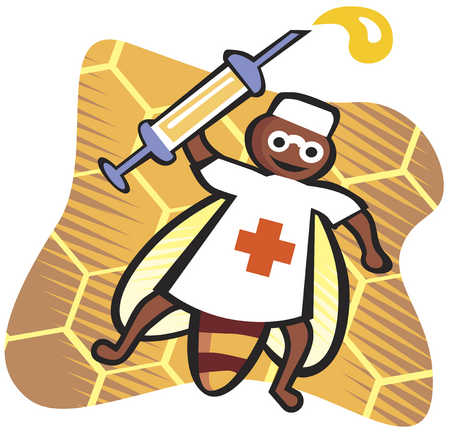 Give it to me straight Doc! Is honey good for you or not?
Give it to me straight Doc! Is honey good for you or not?
Damn it Jim, I’m a beekeeper not a Doctor.
But it is a well known fact that honey has been used to enhance people’s health as a natural remedy for thousands of years. The first written reference to honey, a Sumerian tablet writing, dating back to 2100-2000 BC, mentions honey’s use as a drug and an ointment, while Aristotle referred to pale honey as being “good as a salve for sore eyes and wounds”. Hippocrates, the father of modern medicine, used honey as a base in many of his medicines and ointments and wrote that honey was good for curing carbuncles among many other things. And it must have been, as I never hear of any one complaining about having a carbuncle.(Good Lord – Do not google image carbuncle! Apparently they are still a thing – get those people some honey, stat!)
Honey also figures prominently in traditional Chinese and Ayurverdic medicine – the ancient traditional medicine of India, where is it recommend for a wide variety of applications.

But what does modern science have to say about honey as a medicine? A quick search of the internet will bring up a wide range of miracle cure claims associated with honey. Honey cures Ebola! Honey can regrow your missing ear! etc, etc. I tend not to believe every single claim, especially on the sites that promote honey as some kind of forgotten natural cure-all – most of the time those sites just happen to sell honey too, what a coincidence! That being said, there are some genuine scientific studies that support honey as an effective remedy in specific instances.
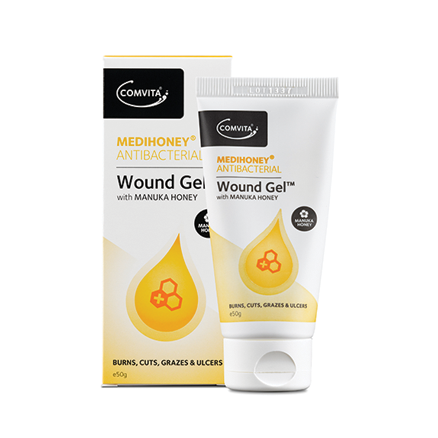
Pour some sugar on me!
Scientific studies and articles, such as this one, have clinically demonstrated the medicinal and anti-bacterial properties of raw honey. Honey’s natural antibacterial properties make it a good medicine for wound care and for several internal digestive problems. Honey disinfects the wound, while keeping additional bacteria out.
Per WOUNDS: A Compendium of Clinical Research and Practice “The physical properties of honey also expedite the healing process: its acidity increases the release of oxygen from hemoglobin thereby making the wound environment less favorable for the activity of destructive proteases, and the high osmolarity of honey draws fluid out of the wound bed to create an outflow of lymph as occurs with negative pressure wound therapy.”
It is so useful that companies sell medical grade honey made from certain the nectar of certain plants, like the manuka tree in New Zealand. Medihoney is one such product.

Dehydrated!
What is it that makes honey antibacterial? It’s the chemistry of honey that gives it some unique characteristics making it a delicious golden slime of death for nasty bacteria. First off, it is acidic, which in itself will kill off almost any bacteria looking to set up shop. Secondly it is a hygroscopic super-saturated sugar solution which means that it wants to absorb water. Any bacteria that comes into contact with the honey have all of the water drawn out of them and become dehydrated like a cow skeleton in the desert. Finally, when the bees are in the process of making the honey they add an enzyme called glucose oxidase and when this enzyme mixes with the nectar, it generates small amounts of hydrogen peroxide within the honey which is another well known bacteria killer. These characteristics make honey a superb anti bacterial agent and are also the reason why honey never goes bad.
What about colds?
If you are walking down the cold and flu isle in Shoppers Drug Mart, there is no shortage of pictures of honey on packaging for cough and cold medicine. Scientific studies say that honey about as effective as over the counter cough medicine in suppressing night time coughs. But if you have the option of giving your kid cough medicine or honey, I like the honey option better personally.
Honey is about on par with chicken soup as a remedy for the common cold. Its positive effects haven’t been irrefutably proven by science, but it seems to make you feel better and is comforting. My favourite use of honey for treating colds is to get a jar and pour raw honey over lemon slices and grated ginger. Keep the jar in the fridge and scoop out a tablespoon or two and mix in a mug of hot water for a natural neo citrin. If you are taking it before bed, I recommend adding some Sailor Jerry’s or Captain Morgan’s.
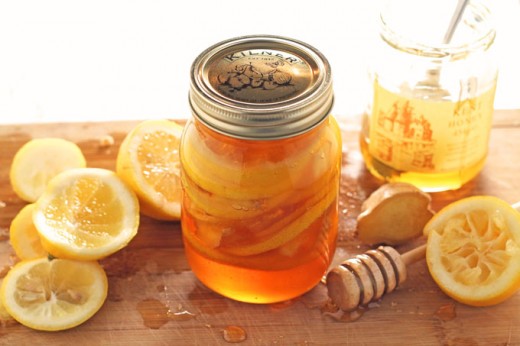
What about allergies?
Some people swear that local honey will help with allergies, and it might to some extent. Allergies are caused by an immune reaction to pollen and local, unprocessed honey contains small amounts of local pollen which when ingested may tell the body that “Hey you don’t have to get all worked up over this, it’s just flower dust”. A bit like a vaccine, give your body a small does so it knows how to deal with it.
The reason why this might not work is that the honey generally contains pollen from flowers, whereas many allergies are caused from pollen that is wind-borne and comes from grasses or trees. If the pollen is different enough, exposing your body to a small amount through honey might have no effect if it is another type of pollen that is causing you grief. I would give this one a definite maybe. It’s worth a shot.
Anything else I should know?
Yes, I have 3 more things to tell you:
- Some people tout the benefits of honey for your skin – Cleopatra was said to bathe in milk and honey. Posh Spice and Kate Middleton apparently are into it too. I can’t say – I’ve never tried, too sticky for me, but this girl seems to be quite happy about it.

2. Apitherapy is a branch of alternative medicine that uses honey bee products including honey, pollen, bee bread, propolis, royal jelly and bee venom. The application of targeted bee stings is a treatment that some people use for arthritis and inflammation in apitherapy and traditional Chinese medicine. I get this treatment for free courtesy of the bees from time to time. If you thought your kids didn’t like going to the dentist, I can tell you right now that this is going to be a significantly harder sell.
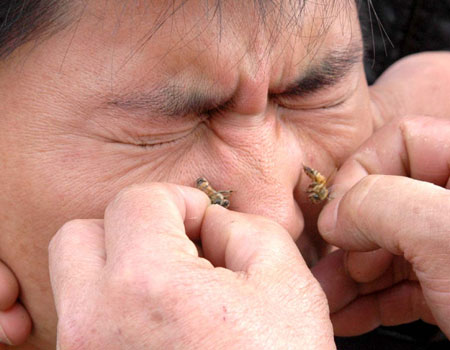
YAOUCH! Bee quiet and take your medicine.
3. Never give honey to infants under one year old. In very rare cases honey can contain spores of Clostridium botulinum, which can germinate in a baby’s immature digestive system and cause infant botulism, a rare but potentially fatal illness. These spores are extremely rare in honey and are harmless to children and adults, but it is best to be safe.
Oh Hey, but what about Nutrition?
As mentioned above, honey has some benefits to keeping your guts healthy. It also contains small amounts of vitamins, minerals, antioxidants, enzymes and amino acids. It is a good option for an energy boost as it provides a dense package of energy that can be quickly absorbed, and since honey is made up of a number of different types of sugars it is absorbed over a longer period of time, providing a steadier supply of energy to your body. Studies have proven that honey delivers a significant performance boost to athletes during strenuous exercise. Honey is also sweeter than regular sugar, so you don’t need to use as much of it in baking or for sweetening your tea.
While honey is significantly better for you than refined table sugar, at its core it is still another form of sugar – so just like Christmas dinner or eye make up, it’s best not to over do it.

Look Bees, I’m a precious flower.
That’s it.
So to sum up, honey is pretty good stuff. I’m not a doctor, nurse or medicine man and none of this should be taken as medical advice, but there is a long history of honey being used as a healing agent. I wouldn’t believe every miracle cure claim that you read about honey remedying, but there is scientific evidence that honey does work as an effective medicine in certain applications.
If you are looking for honey with some of these properties, I would strongly recommend buying local, raw, unprocessed honey as most of the honey you buy in the supermarket is ultra-filtered (takes all the pollen and tiny particles out) and pasteurized (destroys the delicate flavours, enzymes, and other good parts) – so the grocery store honey is often not much different from sugar syrup. Raw honey tastes much better and supports your local beekeepers and local bees in addition to having all of these other excellent properties. It’s nature’s medicine, and it’s some of the best tasting medicine you will ever find.
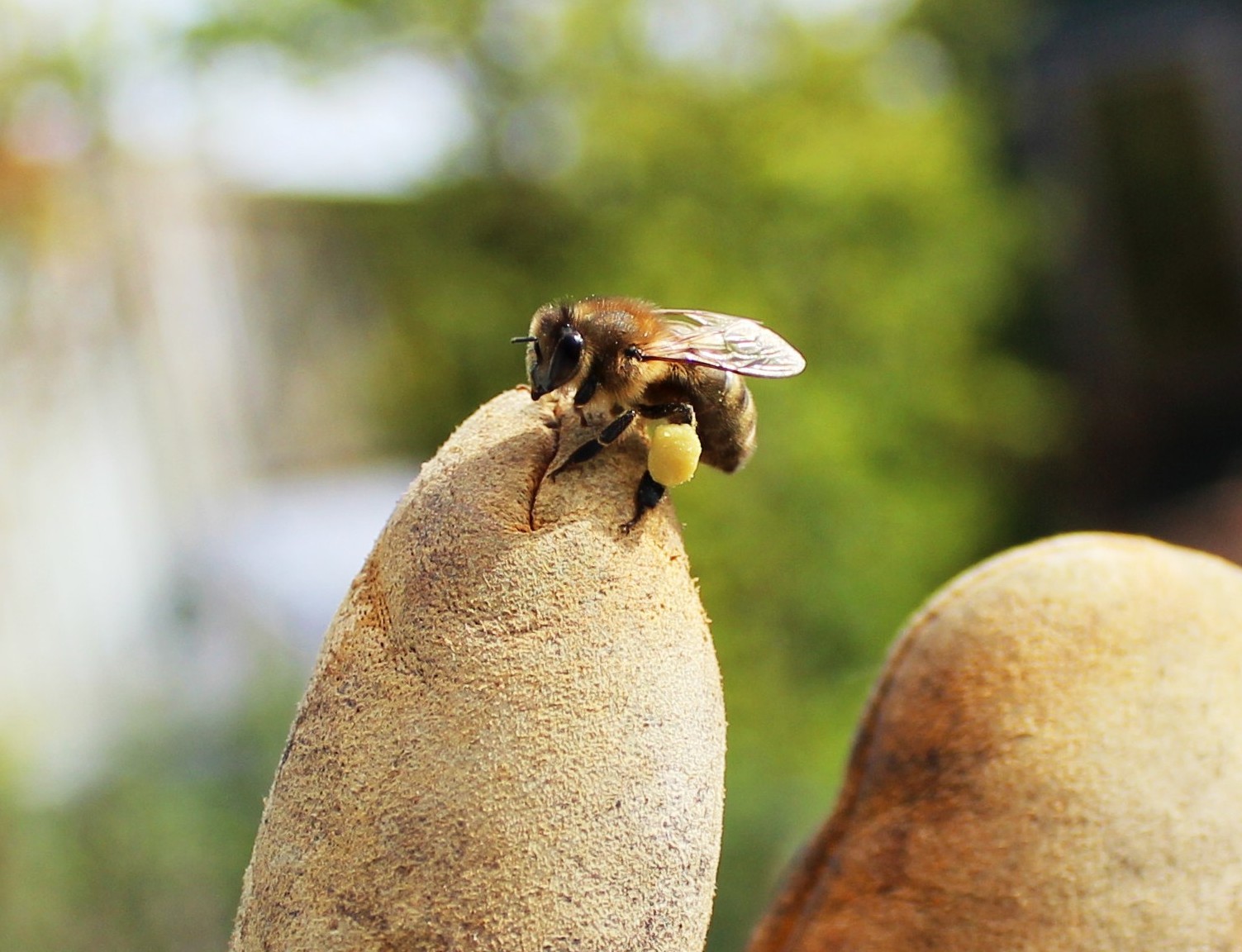
Your skin feels awfully dry
Stay Sweet,
E
